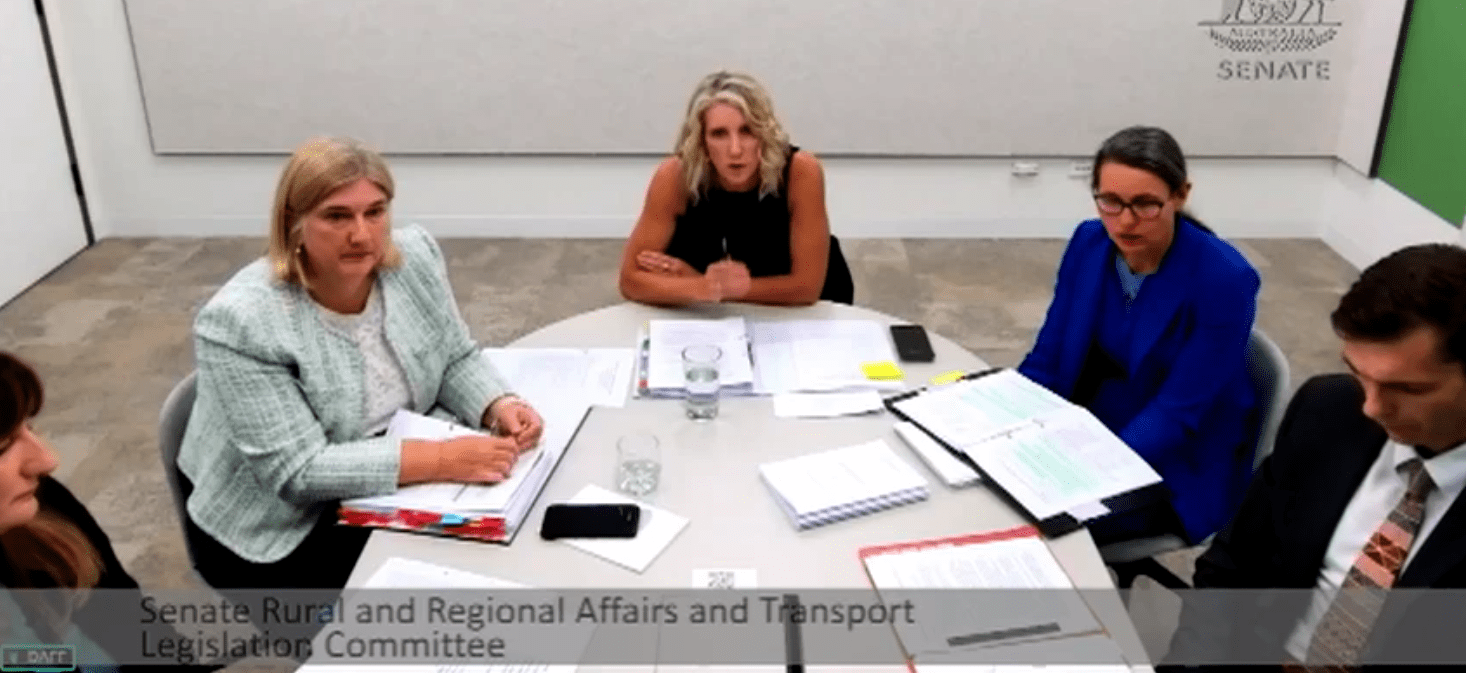
The Senate Rural and Regional Affairs and Transport Legislation Committee heard from DAFF officials (pictured) this week on alternatives to the government’s proposed Biosecurity Protection Levy.
THE DEPARTMENT of Agriculture, Fisheries and Forestry has voiced concerns around a possible container levy or further increases to the Full Import Declaration, proposed by agricultural and freight groups as alternative funds streams to the controversial Biosecurity Protection Levy.
Representatives from DAFF appeared via video link at a hearing held by the Rural and Regional Affairs and Transport Legislation Committee yesterday as part of an inquiry into the proposed BPL and adjourning legislation.
They appeared alongside grains, livestock, horticulture and other farming organisations, which were united in their opposition to the BPL, and confusion around how the levy would be collected and spent.
Most organisations showed general interest and support for a container levy or another funding model which charged “risk creators”, identified as all imported goods.
Several groups, including Cattle Australia, NSW Farmers, and Grain Producers Australia, also backed a suggestion from the Freight & Trade Alliance to increase the FID, a fee charged to all imports valued over $1000, by a modest amount to recoup the $52 million which would be raised by the BPL.
Cattle Australia chief executive officer Chris Parker said government should focus on more reforms to the FID system and ensure all importers are contributing before targeting producers.
“The changes to the FID are long overdue, given there’s been no increase since 2015,” Dr Parker told the inquiry.
Dr Parker acknowledged the recent increase in the FID, but said the rate “only just brought it up to a fair contribution from that sector”.
“There are still significant sectors of the import industry that are not paying and are not subject to the FID, and, really, that is what the container levy is all about.
“We’d simply say that there are sections of the importing industry that are still not paying.”
DAFF deputy secretary – biosecurity and compliance group Justine Saunders told the inquiry that increased charges to importers meant the department was “now recovering the actual cost of biosecurity measures at the border”.
She said the recent FID increases, from $49 to $63 for cargo, would raise “just under $200 million per year extra from importers from 2024-25 onwards”.
Committee deputy chair Senator Matt Canavan questioned whether the FID could be increased “by another $17 or $18” to recover the $52M BPL revenue.
Ms Saunders said further charges “would be a tax to importers” with DAFF only able to “cost-recover those costs from importers”.
“To do anything more than that would bring into question the nature of our trade arrangements and would then potentially have impacts on our own industry as we seek to export, knowing these responsibilities are reciprocal,” Ms Saunders said.
She said this principle was also a barrier to introducing a container levy.
“[A]ny reforms to our border charging models would need to be consistent with Australia’s trade law obligations.
“We need to comply with our international trade obligations, which come from the World Trade Organization and our free-trade agreements, and they provide the discipline with regard to the kinds of charges we can levy on imports.”
Ms Saunders said trade agreements were also “a two-way street” and any increase in charges “need to be considered in the context of implications for us in our exports of goods from this country”.
DAFF general counsel – legislation and training legal practice Cassandra Ireland said the department had “sought advice on the WTO and free trade agreement issues associated with revenue measures”.
However, Mr Ireland said she was not able to provide the advice to the Committee without first consulting with Agriculture Minister Murray Watt.
Industry concerns
Industry group, WoolProducers and state agriculture advocacy bodies, AgForce and NSW Farmers, expressed confusion over the lack of detail from DAFF surrounding barriers to introducing a container levy or further increasing the FID charges.
AgForce senior policy advisor Annie Ruttledge said they “never had any clear explanation for that, despite repeatedly asking”.
WoolProducers Australia chief executive officer Jo Hall said the Department told the group that a container levy would be “really complicated and we could run into some international trade rules”.
“I don’t accept that either of those arguments, given that there has been precedent set,” Ms Hall said.
“New Zealand has had biosecurity system entry levies in place for a number of years.
“In terms of complications, I think the government has underestimated how complicated it is to levy all of our producers.
“I don’t think it’s a viable claim to make that it’s too complicated to impose a container levy, when we’re going through this process.”
Grain Central: Get our free news straight to your inbox – Click here

HAVE YOUR SAY